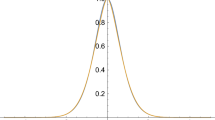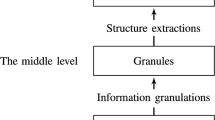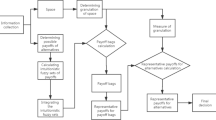Abstract
In situations, where an uncertain variable takes its value in a large space, we can use granulation of the space to simplify the knowledge acquisition process. We observe, however, that this use of granulation can come at the price of introducing imprecision into the related decision process. We note that answers to questions about values related to the original space can often only be answered using interval values. We look at two classes of decision problems where uncertain information about relevant variables is expressed indirectly via information about the uncertainty on related granular objects. To make a precise decision, we require the decision maker to provide some subjective preference information to resolve the interval uncertainty induced by the granulation. In this paper, our major contribution is that we provide an approach to decision making in the face of uncertainty where the uncertain information is expressed on a space of granular objects and the underlying uncertainty is most generally represented by a measure.
Similar content being viewed by others
References
Ahmad SSS, Pedrycz W (2017) The development of granular rule-based systems: a study in structural model compression. Granul Comput 2:1–12
Bargiela A, Pedrycz W (2003) Granular computing: an introduction. Kluwer Academic Publishers, Amsterdam
Beliakov G, Pradera A, Calvo T (2007) Aggregation functions: a guide for practitioners. Springer, Heidelberg
Beliakov G, Bustince H, Calvo T (2015) A practical guide to averaging functions. Springer, Heidelberg
D’Aniello G, Gaeta A, Loia V, Orciuoli F (2017) A granular computing framework for approximate reasoning in situation awareness. Granul Comput 2:141–158
Kacprzyk J, Filev DP, Beliakov G. Yager (2017) Granular, soft and fuzzy approaches for intelligent systems: dedicated to Professor Ronald R. Springer, Heidelberg
Klir GJ (2006) Uncertainty and information. Wiley, New York
Luce RD, Raiffa H (1967) Games and decisions: introduction and critical survey. Wiley, New York
Merigó JM, Yager RR (2013) Generalized moving averages, distance measures and OWA operators. Int J Fuzz Uncertain Knowl Based Syst 21:533–559
O’Hagan M (1990) A fuzzy neuron based upon maximum entropy-ordered weighted averaging. In: Bouchon-Meunier B, Yager RR, Zadeh LA (eds) Uncertainty in knowledge bases. Springer, Berlin, pp 598–609
Pedrycz W (2013a) Granular computing: analysis and design of intelligent systems. CRC Press, Boca Raton
Pedrycz W (2013b) Granular computing. CRC Press, Boca Raton
Pedrycz W, Chen SM (2011) Granular computing and intelligent systems: design with information granules of high order and high type. Springer, Heidelberg
Pedrycz W, Chen SM (2015a) Information granularity, big data, and computational intelligence. Springer, Heidelberg
Pedrycz W, Chen SM (2015b) Granular computing and decision-making: interactive and iterative approaches. Springer, Heidelberg
Pedrycz W, Gomide F (2007) Fuzzy Systems engineering: toward human-centric computing. Wiley, New York
Pedrycz W, Skowron A, Kreinovich V (2008) Handbook of granular computing. Wiley, New York
Ross TJ (2010) Fuzzy logic with engineering applications, 3rd edn. McGraw Hill, New York
Smets P, Kennes R (1994) The transferable belief model. Artif Intell 66:191–234
Takagi T, Sugeno M (1985) Fuzzy identification of systems and its application to modeling and control. IEEE Trans Syst Man Cybern 15:116–132
Yager RR (1986) A general approach to decision making with evidential knowledge. In: Kanal LN, Lemmer JL (eds) Uncertainty in artificial intelligence. North Holland, Amsterdam, pp 317–330
Yager RR (1988) On ordered weighted averaging aggregation operators in multi-criteria decision making. IEEE Trans Syst Man Cybern 18:183–190
Yager RR (1992) Decision making under Dempster–Shafer uncertainties. Int J Gen Syst 20:233–245
Yager RR (2000) Decision making under various types of uncertainty. In: Zanakis SH, Doukidis G, Zopounidis C (eds) Decision making: recent developments and worldwide applications. Kluwer Academic Publishers, Boston, pp 233–250
Yager RR (2002) Using granular objects in multi-source data fusion. In: Proceedings of the third international conference on rough sets and current trends in computing, Philadelphia, pp 324–330
Yager RR (2004) Generalized OWA aggregation operators. Fuzzy Optim Decis Mak 3:93–107
Yager RR (2011) A measure based approach to the fusion of possibilistic and probabilistic uncertainty. Fuzzy Optim Decis Mak 10:91–113
Yager RR (2015) Golden rule and other representative values for intuitionistic membership grades. IEEE Trans Fuzzy Syst 23:2260–2269
Yager RR (2016) Uncertainty modeling using fuzzy measures. Knowl Based Syst 92:1–8
Yager RR (2017) Belief structures, weight generating functions and decision-making. Fuzzy Optim Decis Mak 16:1–21
Yager RR, Alajlan N (2014) Multi-criteria decision making with imprecise importance weights. IEEE Trans Fuzzy Syst 22:882–891
Yager RR, Filev DP (1994) Essentials of fuzzy modeling and control. Wiley, New York
Yager RR, Engemann K, Filev DP (1995) Toward a theory of immediate probabilities. In: Bouchon-Meunier B, Yager RR, Zadeh LA (eds) Fuzzy logic and soft computing. World Scientific, Singapore, pp 157–165
Zadeh LA (1978) Fuzzy sets as a basis for a theory of possibility. Fuzzy Sets Syst 1:3–28
Zadeh LA (1979) Fuzzy sets and information granularity. In: Gupta MM, Ragade RK, Yager RR (eds) Advances in fuzzy set theory and applications. North-Holland, Amsterdam, pp 3–18
Zadeh LA (2005) From imprecise to granular probabilities. Fuzzy Sets Syst 154(3):370–374
Author information
Authors and Affiliations
Corresponding author
Rights and permissions
About this article
Cite this article
Yager, R.R. Decision making under measure-based granular uncertainty. Granul. Comput. 3, 345–353 (2018). https://doi.org/10.1007/s41066-017-0075-0
Received:
Accepted:
Published:
Issue Date:
DOI: https://doi.org/10.1007/s41066-017-0075-0




